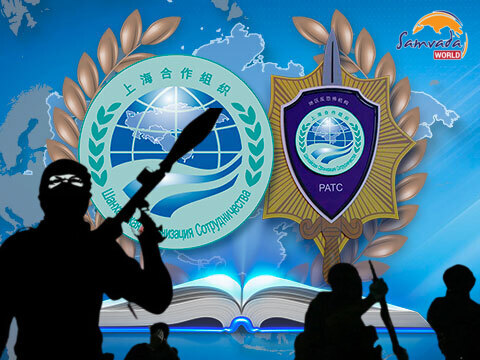|
Getting your Trinity Audio player ready...
|

- The member nations of RATS cooperate with one another and other international organisations to acquire intelligence to combat terrorism.
- India considers RATS an important and effective organisation in the fight against terrorism and has made serious efforts to promote peace, prosperity, and stability throughout the Eurasian region.
- Terrorism emanating from Pakistan and Afghanistan that threatens India’s geostrategic and sovereignty interests is still ignored by RATS.
- The RATS as a forum must be used to promote peace, prosperity, and economic integration, as well as address the legitimate concerns of the SCO through an informed discourse.
As Indian PM Narendra Modi attended the SCO Summit in Samarkand, he emphasised the importance of the Regional Anti-Terrorist Structure (RATS) for enhanced cooperation to fight terror across the region.
RATS was established as a permanent body on June 7, 2002, in St. Petersburg, by the Council of Heads of SCO Member States. Since its founding, RATS has grown to be a key hub for regional and international collaboration in the fight against extremism, terrorism, and separatism. The member nations of RATS cooperate with one another and other international organisations to acquire intelligence to combat terrorism. Additionally, RATS has a database of terrorists and terrorist groups from all of its member nations. Member nations train their military forces for improving their counterinsurgency grid and group coordination through combined terrorist exercises under RATS. The major objective of the SCO is still, however, to strengthen and improve the anti-terrorism capacities of the participating nations in accordance with the fundamental principles of non-intervention.
Accomplishments of RATS
RATS has had several wins against terrorism in the region, between 2011 and 2015, it stopped 20 terror attacks, neutralised 1,700, and resulted in the arrest of 2,700 members of terrorist organisations. This anti-terrorism organisation dismantled 440 terrorist camps, protected member nations from 650 terrorist-related crimes, and collected 450,000 rounds of ammunition and more than 52 tonnes of explosives from various terrorist groups. A list of more than 100 organisations, including “Islamic State,” “Islamic Movement of Eastern Turkestan,” “Hizbut-Tahrir al Islami,” and “Islamic Renaissance Party of Tajikistan,” among others, whose activities are prohibited on the soil of SCO member states, has been created in accordance with the decisions and approval of the RATS SCO Council. Moreover, the SCO has already banned Lashkar-e-Taiba (Pakistan) during its meeting in Bishkek in 2007.
India became a full member of the SCO in 2017 along with Pakistan. Later in 2021, India assumed the Chairmanship of the Council of Regional Anti-Terrorist Structure of SCO (RATS SCO) on October 28, 2021, for a period of one year. Ever since it became a full member, India considers RATS an important and effective organisation in the fight against terrorism and has made serious efforts to promote peace, prosperity, and stability throughout the whole Eurasian area in general and among the SCO members in particular.
Prime Minister Modi at the SCO meeting emphasized the need for greater cooperation to fight terrorism in the region and in this context, he emphasized the important role that SCO can play, including through the work of the SCO RATS organization
Failures of RATS
The SCO was successful in educating and arming its members to combat terrorism under the effect of RATS; nevertheless, terrorism emanating from Pakistan and Afghanistan that threatens India’s geostrategic and sovereignty interests is still ignored. As Pakistan was added to the FATF’s grey list in June 2018, terrorist organisations in the region of Af-Pak used drugs and illicit trade to fund their operations in the Union Territory of Jammu and Kashmir. Due to pressure from FATF, Islamabad has promoted the use of drugs to finance its asymmetrical conflict with India. For instance, 31 kilograms of heroin were discovered along the LOC in Poonch in January 2022. Pakistan has also smuggled drugs into J&K using the international border. As India has been fighting an insurgency in the Union Territory of Jammu and Kashmir for more than 30 years, India should also push that SCO member states include Jaish-e-Mohammed (JeM) and Hizbul Mujahideen (HM) to the list of organisations that are prohibited in SCO territory.
Respect for sovereignty, territorial integrity, and adherence to a code of non-aggression and peaceful conflict resolution are the cornerstones of the SCO. Beijing’s imperial ambitions and constrained strategy have caused concern in New Delhi and even among certain Central Asian Republics about the SCO’s future. The Galwan Valley conflict caused by Chinese aggression along the LAC in Ladakh, and Beijing’s intermittent meddling in Indian domestic affairs have deepened suspicion among New Delhi’s strategic elite. Furthermore, through SCO, China has projected its hegemonic goals of the Belt and Road Initiative (BRI). The CPEC’s passage across Pakistan Occupied Kashmir (POK) is a grave assault on India’s sovereignty and territorial integrity.
Conclusion
As emphasised by India, integration and collaboration within the SCO region are difficult as long as there are differences, divergences, and mistrust over matters of terrorism, drugs, sovereignty, and territorial integration. Prime Minister Modi at the SCO meeting emphasized the need for greater cooperation to fight terrorism in the region and in this context, he emphasized the important role that SCO can play, including through the work of the SCO RATS organization, which is the SCO’s structure to counter the threat of terrorism in the region.
The RATS as a forum must be used to promote peace, prosperity, and economic integration, as well as address the legitimate concerns of the SCO through an informed discourse. If the worries of the members are not resolved, it may affect the security situation in Eurasia and imperil the very establishment of the RATS and in turn the SCO itself.
(Debadrita Shome is pursuing her Master’s in Defence and Strategic Studies. She has an undergraduate degree in Sociology. She is a research scholar keen on Geopolitics, Military History, Defence Affairs, Social Structures and Social Work)

Keep it up Girl !!